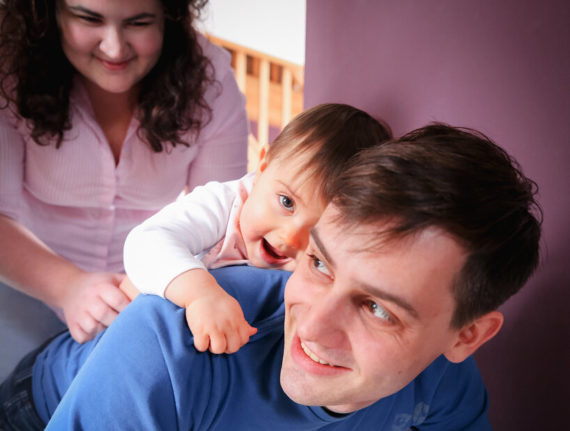What families in Germany need to know about Kindergeld's replacement from 2025

Germany’s coalition government reached an agreement on 'basic child allowance' (Kindergrundsicherung) on Monday. What does this mean for all families in Germany?
Set to replace Kindergeld (child allowance) in its current form from 2025, the benefit will see all families in Germany receive a basic €250 benefit per month per child, while those with a greater financial need would be granted additional benefits.
Some of the negotiations behind the new set of benefits were "really very hard", said Family Minister Lisa Paus (Greens) at the presentation of the results in Berlin on Monday, which followed months of in-fighting between Germany's coalition government. "But it was worth it," she said.
According to Paus, the introduction of the basic child allowance on January 1st, 2025 is initially estimated to cost €2.4 billion more than originally planned.
Up to 5.6 million families at risk of poverty and their children would receive benefits faster, easier and more directly. Among them are millions who did not know they were entitled to them before. The result is the most comprehensive social reform in many years, said Paus.
READ ALSO: More money and less bureaucracy: How Germany wants to change its child benefits system
What is the basic child allowance exactly?
The government parties already agreed in their coalition negotiations that Kindergrundsicherung will be introduced in 2025.
All benefits including a basic allowance, a supplemental allowance, and parts of an "education and participation package" would in future further be bundled into the Kindergrundsicherung.
Why is it being introduced?
The basic child allowance is intended to help less well-off families in particular. Until now, they have had to apply for all kinds of benefits for their children.
As a result, up to 70 percent of families have not claimed their entitlements from the state - to the detriment of their children, said Paus.
The basic child allowance is intended to improve the financial situation of the families concerned. After all, children who grow up in poverty have significantly worse chances for the future, Paus stressed.
Basic and additional amount: How much money can families expect?
The basic amount of Kindergrundsicherung will be at least equal to the current Kindergeld monthly payment in its current amount, or €250 per child per month. This amount is set to be increased every two years.
As a "guaranteed amount", the basic amount is not to be offset against other social benefits.
The additional amount depends on the parents' income. Those who have little should receive more. In addition to a flat rate for education and participation in activities every month (currently €15), the additional contribution should include a flat rate for children's housing costs (currently €150).
If the family's income increases, the additional amount would become smaller.

Photo: picture alliance/dpa/dpa-tmn | Mascha Brichta
Who will receive Kindergrundsicherung?
As with Kindergeld, all children up to the age of 18 are to receive the basic child allowance. Those who then go on to training can receive the basic child allowance until their 25th birthday. Students will even be supported until the age of 27.
Children over 18 who no longer live in their parents' household are to receive the amount directly.
How do I apply for the basic child allowance?
The basic child allowance will require an application. But as soon as the benefit is introduced, an online portal is to be created where the money can be applied for as easily as possible.
Proof of income will then be provided directly by the Finanzamt (tax office).
Finance Minister Christian Lindner (FDP), one of the reform's biggest critics, pointed out that the federal government would not be able to finance another major social reform for several years after the introduction of Kindergrundsicherung given the large costs.
READ ALSO: Germany to cut parental allowance for higher-earning families from 2024
"Higher money transfers aren't the silver bullet," he previously told news portal T-Online last week.
Paus countered in the ARD-Morgenmagazin that the basic child allowance would cost more money, if only because existing benefits were to reach people in Germany. That alone would cost the government around €5 billion.
"Which is money well spent, however, because it is an investment for the children, our future," Paus said. As an example, she cited the child supplement (Kinderzuschlag), a social benefit that only about one in three have applied for so far.
Comments
See Also
Set to replace Kindergeld (child allowance) in its current form from 2025, the benefit will see all families in Germany receive a basic €250 benefit per month per child, while those with a greater financial need would be granted additional benefits.
Some of the negotiations behind the new set of benefits were "really very hard", said Family Minister Lisa Paus (Greens) at the presentation of the results in Berlin on Monday, which followed months of in-fighting between Germany's coalition government. "But it was worth it," she said.
According to Paus, the introduction of the basic child allowance on January 1st, 2025 is initially estimated to cost €2.4 billion more than originally planned.
Up to 5.6 million families at risk of poverty and their children would receive benefits faster, easier and more directly. Among them are millions who did not know they were entitled to them before. The result is the most comprehensive social reform in many years, said Paus.
READ ALSO: More money and less bureaucracy: How Germany wants to change its child benefits system
What is the basic child allowance exactly?
The government parties already agreed in their coalition negotiations that Kindergrundsicherung will be introduced in 2025.
All benefits including a basic allowance, a supplemental allowance, and parts of an "education and participation package" would in future further be bundled into the Kindergrundsicherung.
Why is it being introduced?
The basic child allowance is intended to help less well-off families in particular. Until now, they have had to apply for all kinds of benefits for their children.
As a result, up to 70 percent of families have not claimed their entitlements from the state - to the detriment of their children, said Paus.
The basic child allowance is intended to improve the financial situation of the families concerned. After all, children who grow up in poverty have significantly worse chances for the future, Paus stressed.
Basic and additional amount: How much money can families expect?
The basic amount of Kindergrundsicherung will be at least equal to the current Kindergeld monthly payment in its current amount, or €250 per child per month. This amount is set to be increased every two years.
As a "guaranteed amount", the basic amount is not to be offset against other social benefits.
The additional amount depends on the parents' income. Those who have little should receive more. In addition to a flat rate for education and participation in activities every month (currently €15), the additional contribution should include a flat rate for children's housing costs (currently €150).
If the family's income increases, the additional amount would become smaller.

Who will receive Kindergrundsicherung?
As with Kindergeld, all children up to the age of 18 are to receive the basic child allowance. Those who then go on to training can receive the basic child allowance until their 25th birthday. Students will even be supported until the age of 27.
Children over 18 who no longer live in their parents' household are to receive the amount directly.
How do I apply for the basic child allowance?
The basic child allowance will require an application. But as soon as the benefit is introduced, an online portal is to be created where the money can be applied for as easily as possible.
Proof of income will then be provided directly by the Finanzamt (tax office).
Finance Minister Christian Lindner (FDP), one of the reform's biggest critics, pointed out that the federal government would not be able to finance another major social reform for several years after the introduction of Kindergrundsicherung given the large costs.
READ ALSO: Germany to cut parental allowance for higher-earning families from 2024
"Higher money transfers aren't the silver bullet," he previously told news portal T-Online last week.
Paus countered in the ARD-Morgenmagazin that the basic child allowance would cost more money, if only because existing benefits were to reach people in Germany. That alone would cost the government around €5 billion.
"Which is money well spent, however, because it is an investment for the children, our future," Paus said. As an example, she cited the child supplement (Kinderzuschlag), a social benefit that only about one in three have applied for so far.
Join the conversation in our comments section below. Share your own views and experience and if you have a question or suggestion for our journalists then email us at [email protected].
Please keep comments civil, constructive and on topic – and make sure to read our terms of use before getting involved.
Please log in here to leave a comment.